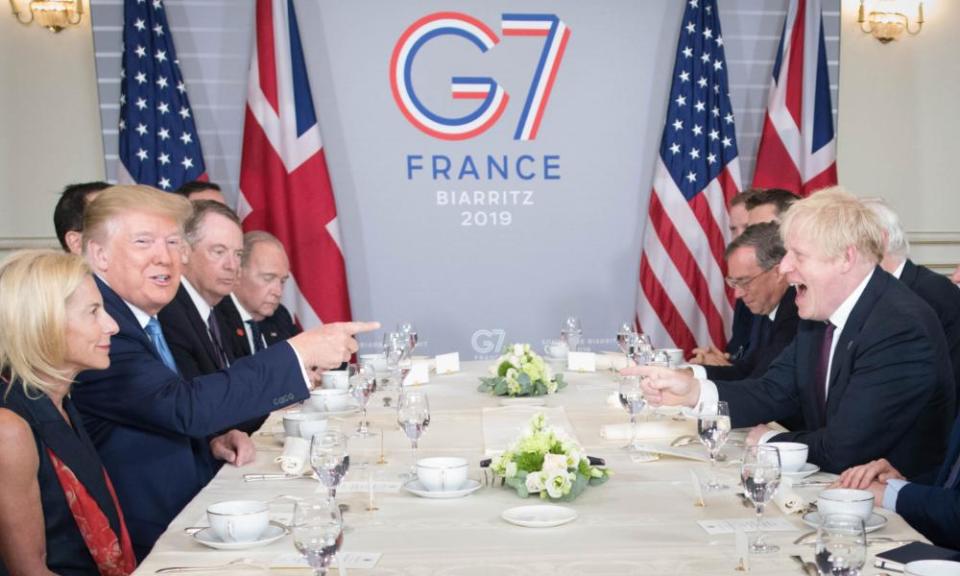White House insists Trump not having second thoughts on China trade war
Donald Trump admitted on Sunday to having second thoughts about raising tariffs against China, sparking brief hopes of a possible truce in the trans-Pacific trade war. But his spokeswoman later insisted the only regret the president had was not imposing even greater tariffs.
Related: Trump says Boris Johnson is 'right man' to deliver Brexit
It appeared to be the latest incident in a White House pattern, in which Trump appears to say something conciliatory in public, only for the olive branch to be snatched back by officials.
At a breakfast meeting with the British prime minister, Boris Johnson, Trump was asked if he was rethinking his decision to escalate tariffs against China.
He replied: “Yeah, sure. Why not?”
Asked again, he repeated: “Might as well. Might as well … I have second thoughts about everything.”
White House spokeswoman Stephanie Grisham, however, said the president’s “answer has been greatly misinterpreted”.
President Trump responded in the affirmative because he regrets not raising the tariffs higher
Stephanie Grisham
“President Trump responded in the affirmative,” she said, “because he regrets not raising the tariffs higher.”
Trump’s chief economic adviser, Larry Kudlow, repeated Grisham’s line.
“That was his thought,” he told CNN’s State of the Union, “it somehow got misinterpreted, I’m not sure he heard the question altogether, it was a very crowded room, I was there. That was his thought, that he needed to go higher.”
Photographers were in the meeting room but were not taking shots when the first question was asked. No one other than the president and his questioners was speaking.
Trump insisted China’s approach to trade had been “outrageous”.
“Presidents and administrations allowed them to get away with taking hundreds of billions of dollars out every year and putting it into China,” he said. The US has long accused China of dumping, forced technology transfers, and wholesale intellectual property theft.
Kudlow said he did not expect China to retaliate against Trump’s latest tariff raise, announced on Friday, telling CBS’ Face the Nation “his was an action to respond to their action. So I doubt whether they’re going to take another step”.
Trump denied he had come under pressure from other leaders at the G7 summit, a club of major industrialised democracies, to ease up on tariffs.
“Nobody’s told me that. Nobody would tell me that,” he said.
But Johnson, speaking alongside him, did object, albeit politely.
After congratulating Trump on “everything the American economy is achieving”, the prime minister added: “But just to register a faint sheeplike note of our view on the trade war: we’re in favour of trade peace on the whole, and dialling it down if we can.
“We think that, on the whole, the UK has profited massively in the last 200 years from free trade, and that’s what we want to see … we don’t like tariffs on the whole.”
“How about the last three years?” Trump responded, laughing. “Don’t talk about the last three. Two hundred, I agree with you.”
On CNN, Kudlow claimed the clip of Johnson saying “we don’t like tariffs” had been “taken out of context” and added: “I’m not sure what you just played was something from that meeting. It sounds to me like it came after the meeting.”
It did not.
On Saturday, Donald Tusk, president of the European council, noted: “Trade wars will lead to recession, while trade deals will boost the economy.”
On Friday, Trump threatened to use national security powers to declare an emergency to force US companies to leave China. That triggered accusations that he would thereby abuse presidential powers not intended for executive control over commercial decisions. Trump insisted he would be acting within his rights.
“I have the right to, if I want,” the president said. “I could declare a national emergency.
“I think when they steal and take out, and – intellectual property theft, anywhere from $300bn to $500bn a year, and where we have a total loss of almost a trillion dollars a year – for many years, this has been going on – in many ways, that’s an emergency.”
Trump said, however, he would not be invoking the 1977 International Emergency Economic Powers Act – originally intended to help the White House isolate rogue regimes – for the time being.

“I have no plan right now,” he said. “Actually, we’re getting along very well with China right now. We’re talking. I think they want to make a deal much more than I do.”
Related: Trump officials voice anger at G7 focus on 'niche' issues such as climate change
Demonstrating a view of how tariffs work that has repeatedly been questioned, he added: “We’re getting a lot of money in tariffs. It’s coming in by the billions. We never got 10 cents from China. So we’ll see what happens. But we are talking to China very seriously.”
In May, Kudlow famously said “both sides will pay” under Trump’s tariff policy. On CNN on Sunday, he was questioned about a report by the nonpartisan Congressional Budget Office that said Trump’s policy would reduce average US household income by $580.
“I probably quibble with that dollar amount that they have,” Kudlow said. “There’s virtually no question in our mind that the largest part of the economic burden on tariffs has fallen on China.”
He added: “To the extent that there is an impact on American businesses and consumers, it is a small impact.”
A key Trump ally, South Carolina senator Lindsey Graham, also appeared on CBS. He put the situation more bluntly.
“We just got to accept the pain that comes with standing up to China,” he said.
